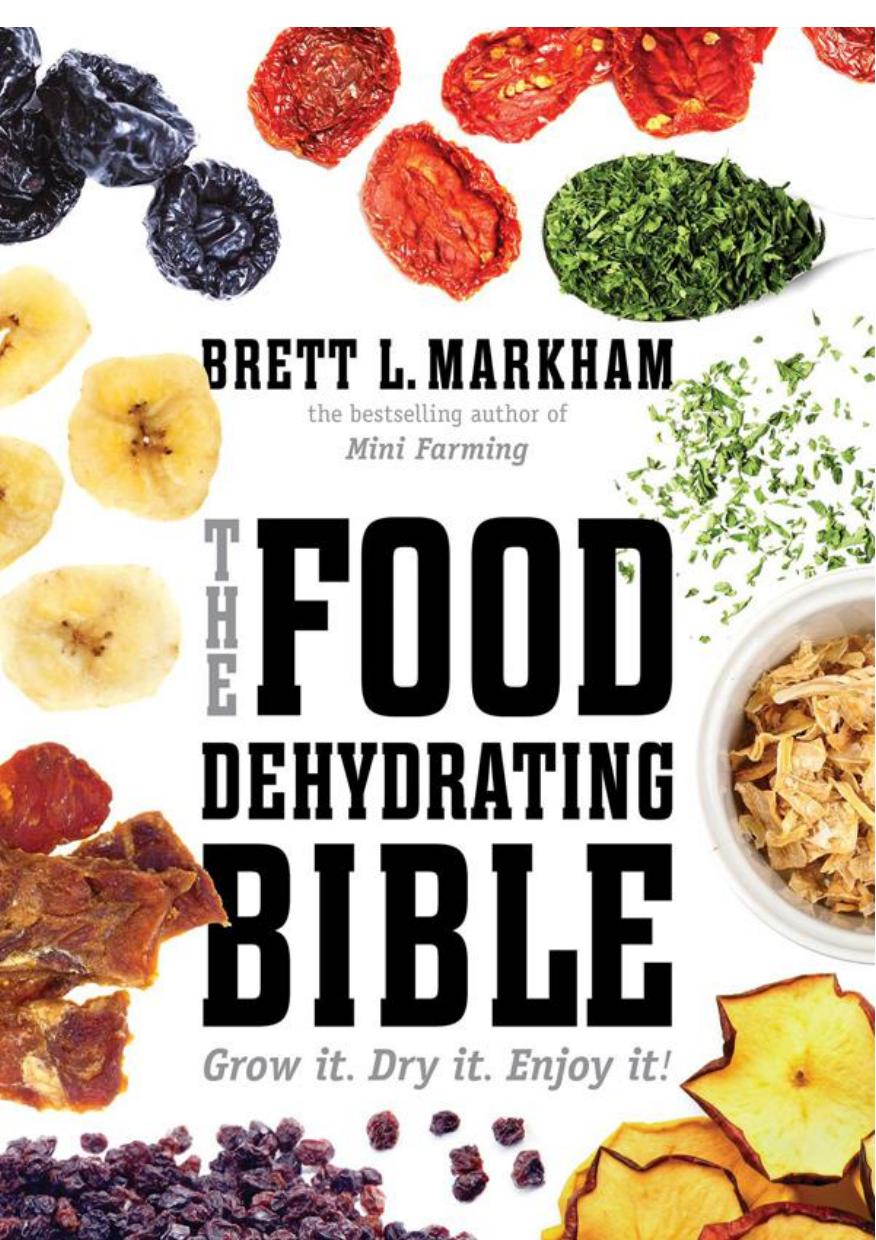The Food Dehydrating Bible by Markham Brett L

Author:Markham , Brett L. [Markham , Brett L.]
Language: eng
Format: epub, mobi, pdf
Publisher: Skyhorse Publishing
Published: 2014-08-31T12:00:00+00:00
In theory, you can dehydrate the meat without spicing or using marinade, and I recommend this for jerky that will be powdered later for making “instant stock.” But in most cases you’ll want to use a marinade because it will allow you to dehydrate at a temperature high enough to kill surface microbes without case hardening the meat. Case hardening happens when the outside dries so quickly that the moisture inside the meat can’t get out. Marinating the meat first prevents this.
Marinades
Marinades for jerky have some commonalities with marinades for other purposes, but the nature of jerky means that it should contain no added oils. Vegetable oils in particular shouldn’t come into contact with jerky. Minerals such as iron will act as a catalyst to make vegetable oils go rancid. So that they can be kept at room temperature, manufacturers refine vegetable oils to remove any minerals. If you add any vegetable oil to a marinade for jerky, the minerals within the meat, such as iron, will act as a catalyst so the vegetable oil will develop bad flavors over time, and the storage life of the jerky will be shortened dramatically.
Beyond this, there are certain basics that can be elaborated upon with infinite variation. Common to nearly all jerky marinades are soy sauce and liquid smoke. There are many varieties of soy sauce available, but if you are sensitive to gluten you should be sure to choose a gluten-free variety. The salt in soy sauce helps the meat stay preserved longer (so long as you keep it sealed for storage), and doesn’t contribute enough sodium to be a medical issue for most people.
Soy sauce contains hydrolyzed soy protein. Though some soy sauces are a true fermented product, most use an industrial process. The soybeans are ground and boiled in a solution of hydrochloric acid then neutralized with lye. This process turns the proteins into free-form amino acids, and the neutralizing results in salt. This is why even soy sauce with no added salt contains a certain amount of it. The glutamic acid formed during hydrolysis imparts a savory flavor, and the salt enhances flavor as well. Gluten-free soy sauce is perfectly fine if you follow a caveman diet that excludes legumes because the hydrolysis breaks down any problematic proteins.3
Liquid smoke is made through what is called “the destructive distillation of wood.” It is literally smoke from a wood fire that has been condensed as a liquid and bottled. If you have ever made biochar in a container, the smoke leaving the container is what would be used to make liquid smoke, after ash and solid residues were removed. Anytime wood is burned, a wide array of substances result, including potentially carcinogenic polycyclic aromatic hydrocarbons. But as we well know from traditional barbecue, smoked hams, and bacon, smoked meat is quite tasty. In the quantities used in making jerky, liquid smoke stays well below the acceptable use limits for carcinogenic compounds.4 Beyond these two ingredients, marinades will typically include ingredients such as onion powder, garlic powder, Worcestershire sauce, and small quantities of cayenne pepper.
Download
The Food Dehydrating Bible by Markham Brett L.mobi
The Food Dehydrating Bible by Markham Brett L.pdf
This site does not store any files on its server. We only index and link to content provided by other sites. Please contact the content providers to delete copyright contents if any and email us, we'll remove relevant links or contents immediately.
| Blenders | Bread Machines |
| Cast Iron | Dehydrators |
| Dutch Ovens | Fondue Pots |
| Food Processors | Fryers |
| Frozen Desserts | Juicers |
| Pressure Cookers | Rice Cookers |
| Slow Cookers | Woks |
Betty Crocker's Good and Easy Cook Book by Betty Crocker(2724)
Food and Water in an Emergency by Food & Water In An Emergency(2407)
Easy Rice Recipes: Learn New Creative Styles Like Spanish, Asian, Oven Baked, Bowls, and Much More by Press BookSumo(2299)
The Art of Making Gelato by Morgan Morano(2255)
Vegan Desserts by Hannah Kaminsky(2087)
Better Homes and Gardens: Wonder Pot by Better Homes & Gardens(2066)
The I Quit Sugar Cookbook by Sarah Wilson(2042)
Project Smoke by Steven Raichlen(2041)
2250 Pressure Cooker, Crock Pot, Instant Pot and Slow Cooking Recipes Cookbook: (Crock-Pot Meals, Instant Pot Cookbook, Slow Cooker, Pressure Cooker Recipes, Slow Cooking, Paleo, Vegan, Healthy) by Jamie Stewart(1979)
Smoke & Spice by Cheryl Alters Jamison(1927)
The Air Fryer Bible by Susan LaBorde & Elizabeth Hickman(1894)
Food Processor Perfection by America's Test Kitchen(1863)
Every Grain of Rice: Simple Chinese Home Cooking by Fuchsia Dunlop(1819)
The Jam and Marmalade Bible by Jan Hedh(1682)
Slow Cooking for Two: A Slow Cooker Cookbook with 101 Slow Cooker Recipes Designed for Two People by Mendocino Press(1658)
Sweetly Raw Desserts: Raw Vegan Chocolates, Cakes, Cookies, Ice Cream, and More by Heather Pace(1633)
The French Baker by Sébastien Boudet(1623)
The Wood Pellet Smoker and Grill Cookbook by Peter Jautaikis(1581)
Idiot's Guides - Pressure Cooking by Tom Hirschfeld(1567)
